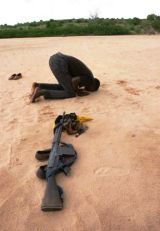No peace talks without prosecutions – Darfur rebels
By Ed Harris
ASMARA, March 11 (Reuters) – A second Darfur rebel group said it would not take part in peace talks until war crimes suspects in the troubled Sudanese region were referred to an international court for trial.

|
|
A rebel of SLA prays on the sand. (Reuters) . |
Thursday’s statement by the Sudan Liberation Army (SLA), issued jointly with the other main rebel group, the Justice and Equality Movement (JEM), casts further doubt on whether a new round of peace talks will start as planned in the Nigerian capital Abuja later this month.
The JEM initially announced its position earlier in the week, saying it wanted to see the process of prosecutions begin before returning to the negotiating table.
The African Union, which sponsors the talks, is holding separate meetings with rebels and the government in an attempt to find common ground after several rounds of talks failed last year to produce an effective ceasefire deal.
The two rebel movements issued a joint statement outlining their position at a news conference on Thursday evening in the Eritrean capital of Asmara, where they have offices.
“The two movements view the issue of the trial of the perpetrators (of war crimes and crimes against humanity) as the foremost priority in resolving the conflict in Darfur,” it said.
“The proceedings for their trial must commence before resumption of any negotiations (justice before peace),” the statement added.
JEM President Khalil Ibrahim added: “Our position is quite clear. Both movements declared that we are not going to resume any peace talks with this government unless the prosecution process starts.”
WAR CRIMES SUSPECTS
A U.N.-appointed commission of inquiry into the fighting in Darfur stopped short of agreeing with a U.S. declaration of genocide there, but gave Secretary-General Kofi Annan a sealed list of 51 people suspected of war crimes.
The U.N. Security Council is divided over whether to refer the accused to the International Criminal Court as the commission recommends.
The two main rebel groups took up arms in early 2003 accusing Khartoum of neglect and discrimination again non-Arabs.
The United Nations says the government armed Arab militias known locally as Janjaweed to quash the rebellion. The Janjaweed now stand accused of a widespread campaign of killing, rape, looting and burning in non-Arab villages.
Khartoum admits arming some militias to fight the rebels but denies any links to the Janjaweed, calling them outlaws.
Tens of thousands of people have been killed in the fighting and almost 2 million have fled their homes to makeshift camps, where thousands die every month from malnutrition and disease.
“The U.N. Commission for genocide inquiry in Darfur took only three months. Now just to bring 51 persons to justice should not take more than one month,” said Khalil.
Representatives from both movements said the 53-nation African Union had lost its credibility in Darfur because its peace monitors in the region were ineffective, and they asked the U.N. to replace some 2,000 AU peace monitors deployed there.
